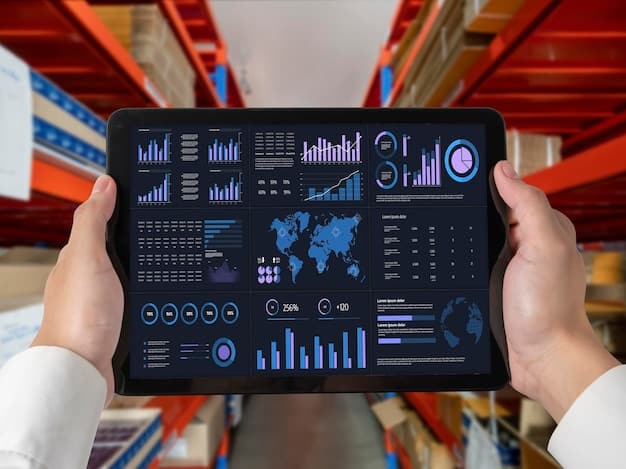Import/Export Compliance: Startup Guide to Customs Regulations in 2025

Import/Export Compliance: Navigating Customs Regulations for Your Startup in 2025 requires careful planning and adherence to evolving regulations. This encompasses understanding tariff classifications, trade agreements, and restrictions to ensure smooth, legal international transactions and to avoid costly penalties.
Starting a business that involves international trade can be exciting but also complex. One of the biggest challenges is understanding and adhering to import/export compliance: navigating customs regulations for your startup in 2025. It’s essential to get it right from the start to avoid costly mistakes and legal issues.
Are you ready to learn how to successfully navigate customs regulations and ensure your startup thrives in the global market? Let’s explore the key aspects of import/export compliance.
Understanding Import/Export Compliance in 2025
In the landscape of global trade, import/export compliance: navigating customs regulations for your startup in 2025 has never been more crucial. As your startup ventures into international markets, a clear understanding of these regulations is paramount for smooth operations and sustainable growth.
Key Components of Import Compliance
Import compliance involves several essential elements. These ensure that goods entering a country meet all legal requirements and standards.
- Tariff Classification: Correctly classifying your goods using the Harmonized System (HS) codes is the foundation of import compliance.
- Customs Valuation: Accurately determining the value of your imported goods is crucial for calculating duties and taxes.
- Country of Origin: Knowing the origin of your goods affects duty rates and eligibility for preferential trade agreements.
- Documentation: Providing complete and accurate documentation, such as commercial invoices and packing lists, is vital for customs clearance.
By focusing on these key components, you minimize the risk of delays, penalties, and legal issues, setting a strong foundation for your startup’s import operations.

Key Components of Export Compliance
Export compliance focuses on adhering to regulations governing the shipment of goods out of a country. This involves understanding export controls and restrictions.
- Export Licensing: Determining whether your goods require an export license based on their nature and destination is essential.
- Denied Parties Screening: Ensuring that you are not doing business with individuals or entities on government-denied lists is a critical compliance measure.
- Destination Control: Complying with regulations that restrict where your goods can be shipped to prevent unauthorized re-exports.
- Record Keeping: Maintaining detailed records of your export transactions is necessary for audits and compliance reviews.
Ensuring these key components are adhered to, will help you minimize the risk of penalties, ensuring a compliant and successful export operation.
To wrap up, understanding both import and export rules is critical for a startup’s international success. These rules help businesses avoid problems and make sure things go smoothly as they grow.
Strategies for Navigating Customs Regulations
Effectively navigating customs regulations requires a combination of proactive strategies and continuous learning. For any startup involved in import/export compliance: navigating customs regulations for your startup in 2025, adopting these approaches can significantly reduce risks and enhance operational efficiency.
Leveraging Technology for Compliance
Technology plays a vital role in streamlining compliance processes and improving accuracy.
- Automation: Using software to automate tasks such as tariff classification and export documentation reduces manual errors.
- Data Analytics: Analyzing trade data to identify trends and optimize supply chain operations enhances compliance efforts.
- Cloud-Based Platforms: Utilizing cloud platforms for document management and compliance tracking ensures accessibility and collaboration.
By embracing these technological solutions, startups can streamline processes, reduce errors, and maintain a strong compliance posture in the face of evolving regulations.
Building a Robust Compliance Program
Creating a structured compliance program is essential for managing risks and ensuring adherence to regulations effectively.
- Risk Assessment: Conducting regular assessments to identify potential compliance risks helps prioritize areas for improvement.
- Training Programs: Providing comprehensive training to employees on import/export regulations fosters a culture of compliance within the organization.
- Internal Audits: Performing periodic audits to verify compliance procedures are followed and identify areas for improvement.
These systems create a disciplined approach to compliance, minimizing the chance of mistakes and highlighting areas that need attention.

Working with Customs Brokers
Customs brokers are licensed professionals who assist businesses with navigating customs regulations.
- Expert Guidance: Customs brokers provide expert advice on tariff classification, valuation, and documentation requirements.
- Efficient Clearance: They facilitate the smooth and timely clearance of goods through customs, minimizing delays and costs.
- Compliance Support: Customs brokers help businesses stay informed about regulatory changes and ensure compliance with all applicable laws.
Working closely with customs brokers enhances your startup’s ability to maintain a compliant and efficient import/export operation.
To summarize, customs rules can be tricky, but using tech and smart programs makes it much easier for startups to stay on the right track.
Common Challenges in Import/Export Compliance
Despite best efforts, businesses often encounter challenges in maintaining import/export compliance. Recognizing these challenges is the first step toward developing effective strategies to address them. Startups that are focused on import/export compliance: navigating customs regulations for your startup in 2025 need to be prepared for these issues.
Dealing with Regulatory Changes
Import/export regulations are subject to frequent changes, making it difficult for businesses to stay up-to-date.
Staying informed about regulatory changes can be difficult with the constant flux of information. Many businesses use:
- Subscription Services: Subscribing to updates from trade associations and government agencies ensures timely access to regulatory changes.
- Legal Counsel: Engaging legal counsel specializing in trade law provides expert guidance on interpreting and complying with new regulations.
- Continuous Training: Conducting regular training sessions for employees keeps them informed about the latest regulatory requirements.
By prioritizing regulatory awareness, businesses can proactively adapt to changes and avoid costly compliance failures.
Managing Complex Documentation
The documentation requirements for international trade can be extensive and complex.
Correctly classifying your goods ensures accuracy while avoiding errors. Many businesses use:
- Standardized Templates: Develop standardized templates for common documents such as invoices, packing lists, and certificates of origin.
- Digital Document Management: Implement a digital document management system to efficiently organize, store, and retrieve trade documents.
- Cross-Functional Collaboration: Foster collaboration between departments to ensure consistent and accurate information across all trade-related documents.
By implementing these strategies, businesses can streamline documentation processes and reduce the risk of non-compliance.
Navigating Different Trade Agreements
Understanding and leveraging preferential trade agreements can be challenging for startups.
Businesses can avoid penalties by using strategies that align with these trade agreements, like:
- Agreement Analysis: Conducting thorough analyses of trade agreements to identify opportunities for reduced duties and streamlined procedures.
- Origin Rules Compliance: Ensuring goods meet the rules of origin requirements to qualify for preferential treatment under trade agreements.
- Certificate Verification: Implementing procedures for verifying the validity of certificates of origin to prevent fraudulent claims.
Using these strategies will not only help your business, but create a streamlined export experience.
In short, import/export is not easy, but staying flexible and informed can help new businesses deal with tough times.
Preparing for Future Trends in Customs Regulations
As we approach 2025, several trends are poised to shape the future of customs regulations. Startups focused on import/export compliance: navigating customs regulations for your startup in 2025 need to anticipate these changes to remain competitive and compliant.
Increased Use of Technology and Automation
Technology will continue to play a central role in customs processes, driving automation and efficiency.
- Artificial Intelligence (AI): AI-powered solutions will enhance risk assessment, fraud detection, and customs clearance processes.
- Blockchain Technology: Blockchain will improve supply chain transparency and security, facilitating seamless trade transactions.
- Automated Border Controls: Advanced technologies such as biometric scanning and automated license plate recognition will streamline border crossing procedures.
By adopting these technologies, startups can enhance compliance outcomes, making the entire import/export process easier.
Focus on Data Security and Privacy
With increasing data exchange in international trade, data security and privacy will become paramount.
- Cybersecurity Measures: Implementing robust cybersecurity measures to protect trade-related data from cyber threats and breaches is vital.
- Data Encryption: Using encryption technologies to secure sensitive data during transmission and storage ensures confidentiality.
- Privacy Compliance: Adhering to data privacy regulations such as GDPR and CCPA safeguards the personal information of customers and trading partners.
By prioritizing data protection, startups build trust with stakeholders and maintain a strong compliance posture in the global marketplace and promote growth as a business.
Emphasis on Sustainability and Ethical Sourcing
Consumers and regulators are increasingly focused on sustainability and ethical sourcing practices.
- Supply Chain Transparency: Promoting transparency throughout the supply chain ensures ethical sourcing and environmental responsibility.
- Environmental Compliance: Adhering to environmental regulations and standards reduces the environmental impact of trade activities.
- Social Responsibility: Implementing social responsibility measures to protect workers’ rights and promote fair labor practices fosters a positive brand image.
By embracing sustainability and ethical sourcing, startups can meet evolving consumer expectations and enhance their long-term competitiveness.
In conclusion, watching future trends and preparing for them can help imports/exports stay competitive and meet new customer demands.
Building a Strong Compliance Team
A dedicated and knowledgeable compliance team is essential for maintaining import/export compliance: navigating customs regulations for your startup in 2025. Building a skilled team that can navigate the complexities of international trade is a strategic investment for your startup.
Hiring Experienced Professionals
Recruiting professionals with expertise in import/export regulations is critical for building a competent team.
- Job Descriptions: Develop detailed job descriptions that clearly outline the roles and responsibilities of compliance personnel.
- Industry Experience: Seek candidates with relevant experience in customs brokerage, trade compliance, or international law.
- Certifications: Prioritize candidates with certifications such as Certified Customs Specialist (CCS) or Certified Export Specialist (CES).
These team members are crucial to ensure your startup adheres to complex import/export regulations for a competitive advantage.
Investing in Training and Development
Ongoing training and development are essential for keeping your compliance team up-to-date with the latest regulations and best practices.
- Regulatory Updates: Conduct regular training sessions to inform employees about changes in import/export regulations.
- Skills Enhancement: Provide opportunities for compliance personnel to enhance their skills through workshops, seminars, and online courses.
- Cross-Training: Implement cross-training programs to ensure that team members are proficient in multiple aspects of compliance.
These programs make sure that the team is ready to handle and address the ever changing and complex climate of import and export.
Fostering a Culture of Compliance
Creating a culture of compliance within your organization is essential for promoting ethical behavior and minimizing compliance risks.
- Leadership Commitment: Demonstrate leadership commitment to compliance through clear policies, procedures, and communication.
- Employee Empowerment: Empower employees to report compliance concerns without fear of retaliation and recognize and reward compliance efforts.
- Open Communication: Foster open communication channels to encourage employees to seek guidance and clarification on compliance matters.
By fostering a strong compliance culture, organizations minimize compliance risks and promote ethical behavior throughout the global supply chain.
Overall, a strong team can make all the difference when dealing with import/export rules, keeping the international trade process smooth and efficient for any growing business.
| Key Point | Brief Description |
|---|---|
| 🔑 Compliance Importance | Understanding import/export compliance is crucial for avoiding legal and financial issues. |
| 🌐 Global Trade | Navigating international markets requires adherence to evolving customs regulations. |
| 🤖 Technology | Leveraging automation and AI enhances compliance efforts and reduces manual errors. |
| 📚 Regulatory Changes | Staying updated with regulatory changes is vital for proactive compliance and avoiding penalties. |
FAQ
Import/export compliance includes adhering to a country’s laws and regulations regarding the import and export of goods. This involves proper documentation, tariff classification, and valuation.
Compliance is crucial for startups to avoid legal penalties, fines, and delays in shipping. It also helps maintain a good reputation and build trust with international partners.
Technology streamlines processes like tariff classification, documentation, and data analysis. It reduces manual errors and ensures accurate records, enhancing efficiency in import/export compliance: navigating customs regulations for your startup in 2025.
Common challenges involve staying updated with regulatory changes, managing complex documentation, and navigating different trade agreements. These require constant monitoring and proactive strategies.
Startups should prepare for increased technology use, enhanced data security, and a greater emphasis on sustainability and ethical sourcing. Adapting to these trends is part of import/export compliance: navigating customs regulations for your startup in 2025.
Conclusion
In conclusion, import/export compliance: navigating customs regulations for your startup in 2025 can be complex, but is manageable with the right knowledge and strategies. Understanding key components, leveraging technology, and building a strong compliance team are essential for success.
By staying informed, proactive, and adaptable, your startup can thrive in the global marketplace while minimizing compliance risks and maximizing opportunities.





